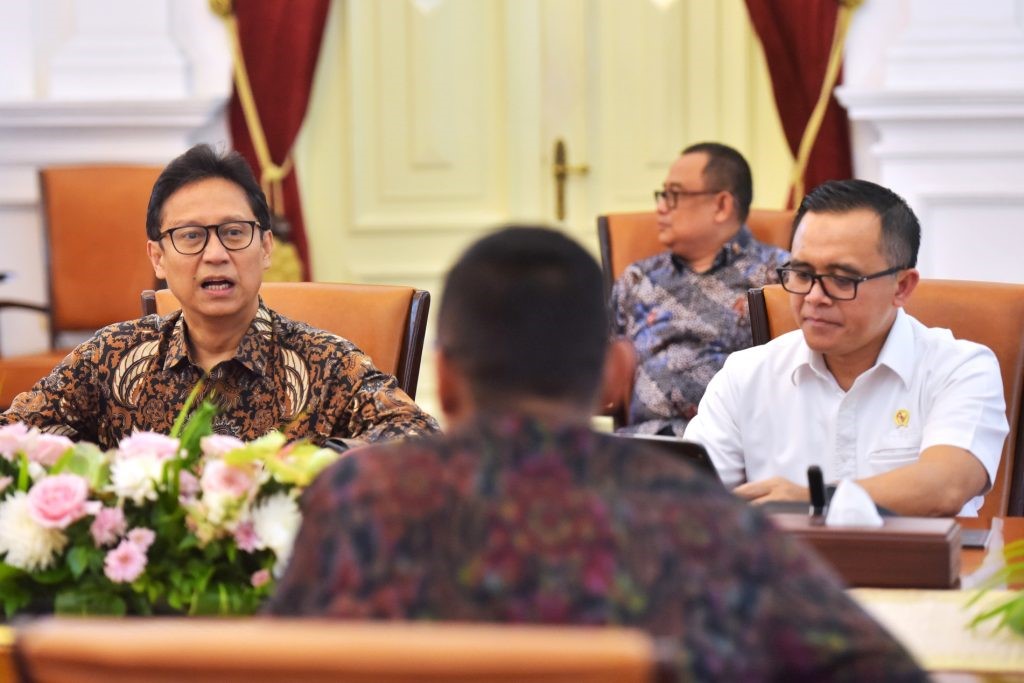Health Minister Reveals Measures to Control Air Pollution Impacts on Health

Health Minister Budi Gunadi Sadikin and Minister of State Apparatus Empowerment and Bureaucratic Reforms Abdullah Azwar Anas during a limited meeting on measures to improve air quality in Jabodetabek area at Merdeka Palace in Jakarta, Monday (08/28). (Photo by: PR/Agung)
President Joko “Jokowi” Widodo has ordered Minister of Health and Minister of Environment and Forestry to adjust air quality standards in accordance with the most recent standards that have been increased by the WHO.
Minister of Health Budi Gunadi Sadikin made the statement in his press statement following a limited meeting on improvement of air quality in the regions of Jakarta, Bogor, Tangerang, and Bekasi (Jabodetabek) led by President Jokowi at Merdeka Palace in Jakarta, Monday (08/28).
“There is another guideline from the WHO on air pollution standards that must be met to maintain the people’s health. The President ordered it to be discussed with the Minister of Environment and Forestry. The Minister of Environment and Forestry will be the one setting the standards so that the same standards are used in all industries,” he said.
Budi stated that to maintain air quality, his ministry has equipped community health centers in Jabodetabek with monitoring tools that can detect the level of PM 2.5 in real time.
“We have monitoring tools at community health centers that we distribute as sanitarian kit. They are commonly given to all community health centers, but they are for indoor measurement. They can be used for outdoor measurement but not continuously, as Minister of Environment and Forestry has stated, to discover the components of air, soil, and water,” he said.
“A particulate matter in the air that is dangerous to health is PM 2.5. Why? It can enter alveoli in the lungs, which causes pneumonia to occur. That is why the health sector pays attention to PM 2.5. It can enter the body and causes pneumonia, which imposes the largest burden on BPJS (Healthcare and Social Security Agency),” he said.
Budi further said that to reduce health risks and impacts caused by air pollution, Ministry of Health will provide education to the people about the dangers of air pollution to health.
Budi pointed out that air pollution greatly contributes to causing the six most common respiratory diseases in Indonesia, namely pneumonia, upper respiratory tract infection, asthma, tuberculosis, lung cancer, and chronic obstructive pulmonary disease, adding that those diseases caused a burden of Rp10 trillion in 2022 and show an increased trend this year.
In addition, Ministry of Health, Budi said, also promotes the use of mask as a preventive measure to take when air pollution is higher than the set standards.
“The masks must be at least KF 94 or KN 95 that have the ability to block PM 2.5 because it is the dangerous one. It can enter the lungs. It can enter blood vessels in the lung due to its tiny size. It is a fine particulate, so the masks must be in the same class as KF 94 or KN 95 for prevention,” he said.
Budi also stated that the Ministry of Health will provide education to doctors at community health centers and hospitals in Jabodetabek about respiratory disease treatment measures while expressing hope that if the people must be hospitalized due to those diseases, they can receive equal treatment. (DND/UN) (DH/MMB)








